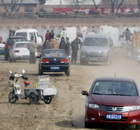-
-
China Daily E-paper
Han Dongping
The US is turning human rights into a farce
By Han Dongping (chinadaily.com.cn)
Updated: 2010-03-16 15:55
 |
Large Medium Small |
The US State Department has published its routine annual reports on human rights records of different countries for this year. This year’s reports again pointed fingers at the human rights records of a few countries including China. In response, China published its own report on US human rights records.
No country in this world has impeccable records on human rights. Therefore, it should be healthy for governments of different countries to exchange ideas on human rights if the intention of these exchanges is to improve human rights performance in this world.However, the routine US reports on different country’s human rights records are gradually turning the noble concept of human rights into a big farce as it engaged two deadly wars, causing lives of innocent people in Iraq and Afghanistan.
Human rights are a noble concept, because they are an attempt to transcend the limitations of our world of nation states. They represent the highest aspirations of our human race. Throughout human history, we humans live as members of ethnic groups and citizens of nation states. People of different ethnic groups and citizens of different nation states rarely take the rights of other ethnic groups and citizens of other states seriously.
| ||||
Wars always cause huge civilian casualties. Anybody who cares about human lives would not start an aggressive war lightly knowing that a great number of human lives would be lost. But the imperialists never hesitated to start aggressive wars. In their eyes, the loss of human lives in the third world countries are simply collateral damages.
The irony of the confrontation between China and US over human rights on the one hand, and confrontation between the US and other third world countries on the other, is that their confrontation is not about human rights after all. The US has tremendous human rights problems itself, as China’s report on US human rights records indicates, but it is arrogant enough to behave like a world human rights police to lecture others about human rights while it has engaged in blatant human rights violations around the world. After the US invasion of Iraq with questionable excuses, not many people in this world still give US any creditability about its human rights credentials now. It is high time that the US State Department recognize this reality.
I am objecting to US pointing fingers about other countries’ human rights because it represents the arrogance of the powerful imposing its values on weak countries. Throughout human history the powerful always impose its values on the weak. It was white man’s burden in the past, and it is human rights today, and it will be something else tomorrow. The powerful will always find a way to impose its wishes on others. For the sake of world peace, and for the sake of harmonious co-existences of different cultures and different people, can the powerful show a little bit respect for the weak country for a change, and stop pointing fingers at the weak? Let us see what difference can that make for our world?
I am objecting to US human rights rhetoric because it is based on ignorance and questionable intentions. Different countries have different culture and different ethnic composition which is very complicated. Different ethnic groups learned how to coexist peacefully through compromise, as well as take and give. China has fifty five minority nationalities. For most part of China’s recent history, Chinese people of different nationalities have been able to live peacefully and harmoniously except two cases, the Uyghur people in Xinjiang and the Tibetan Monks in Tibet, both with extensive outside supports and connections. Tibetan Monks rioted in 2008 ,an effort to embarrass China before the Beijing Olympic games, caused a large number of innocent lives. The Uyghur separatists orchestrated the July 5 riots in Urumqi last year, consuming close to two hundred innocent lives. The US and other western nations always responded to riots in their countries with an iron fist and brutal force. But when China took restrained measures to deal with the riots in Tibet and Xinjiang, the US and West always unfairly criticize Chinese Government actions on suppressing the riots. The irresponsible criticism on the part of US could easily incite more riots in the sensitive regions of China.
I am objecting to US rhetoric about human rights in other countries also because it is misleading. The US Government, just like any government of nation states in this world, is not really concerned about the human rights of citizens of other nation states. It made it sound like that the US government cared about the human rights of other people in the world, and that the dissidents of others countries can count on US support when they get into trouble confronting their government. But the truth of the matter is that the US only used the human rights as a foreign policy tool to get some diplomatic leverage, or to empower and embolden the dissidents or opposition forces in countries with which the US has issues. The primary goal is to put pressure on the government, and supporting the dissidents or the opposition forces is only secondary or means to achieve the primary goal. Many dissidents and opposition forces in the third world countries misread US intentions in promoting human rights in this world, and often act as US foreign policy instruments in the end.
A professor of sociology at Simon Frazer University once estimated that 90 percent of the troubles in this world can be traced to the US foreign policy. I do not know how that professor came out with that estimate. But the riots in Tibet, and the riot in Xinjiang to a lesser degree, had a lot to do with outside support, are no longer secret any more. For the sake of world peace, and in order to promote harmonious coexistence of different cultures in this world, I am calling upon the US State Department to stop pointing fingers at other countries’ human rights records, and stop irresponsibly criticizing other countries’ dealing with minority issues, like China’s dealing with the riots in Tibet and Xinjiang, before getting the facts straight. Innocent lives have been lost in these riots. Minority rights should be protected and supported. But use of violence against innocent civilians as a way of airing grievances are acts of terrorism and should never be encouraged and supported. The US can not wage a war on terrorism which are targeting the US, and supporting terrorism against China and other third world countries at the same time.
The opinions expressed are author's own.













